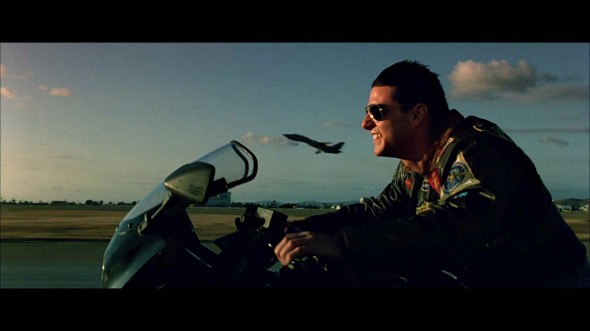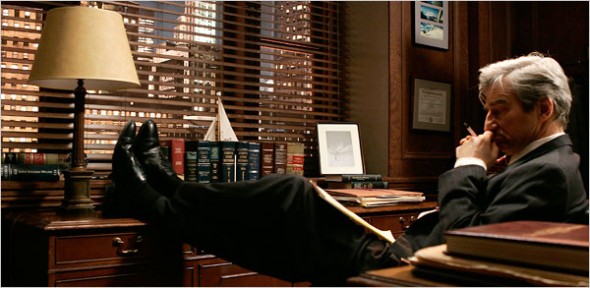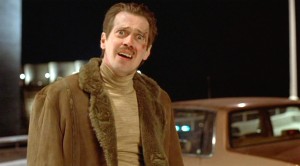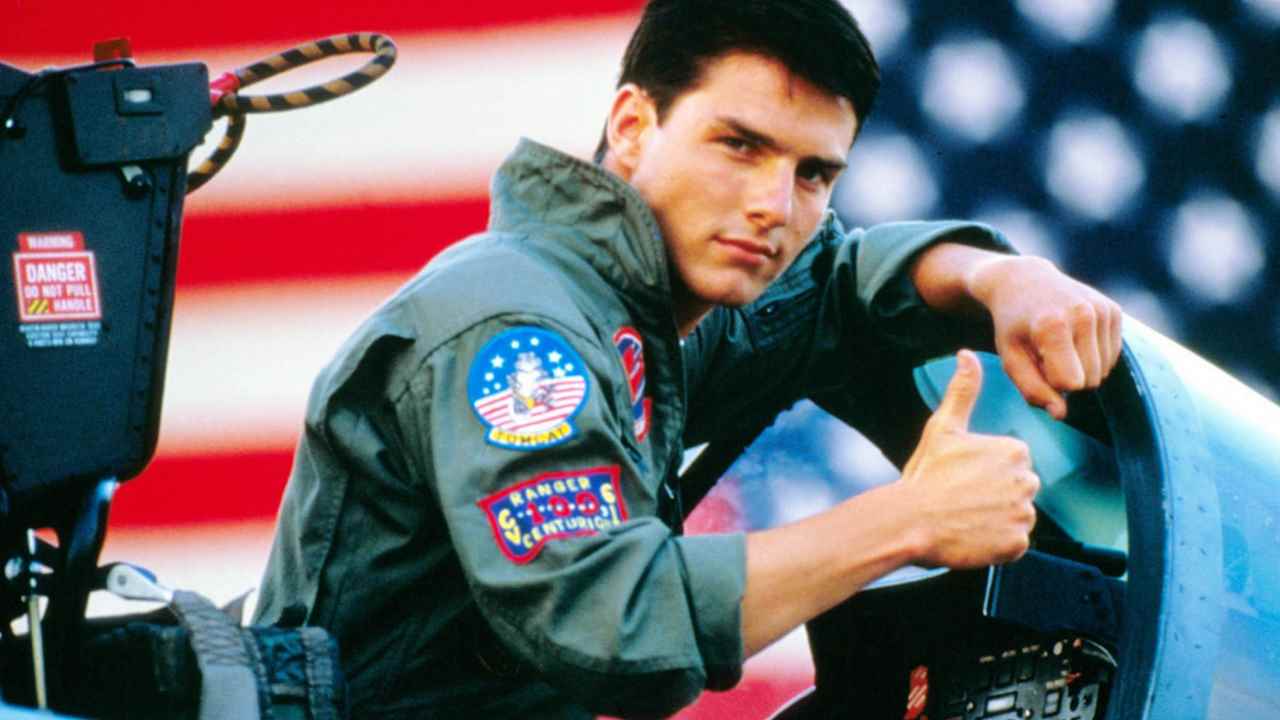Two weeks ago, in my article about bringing The West Wing back to TV, I made an off-hand comment about the role that the show plays in the popular imagination – “It’s Top Gun for political nerds.” The analogy works because Top Gun has a particular role in the popular consciousness. Not only does it romanticize and lionize fighter pilots for the general public, but it in large part defines the Naval Aviation community for the vast majority of the audience. I have friends that are fighter pilots, and the first thing that anyone asks when they find out what my friend does is “Oh, like in Top Gun?”

Just like that! But with more motorcycles!
Of course, Top Gun is just one of many prominent examples of pop culture that is so defining for a community or sub-culture that it becomes a type of short hand, a way of translating for the public. It’s Rocky for boxers, or Law and Order for lawyers. Not all the examples are positive – it’s also The Godfather for the Mob or Wall Street for stock brokers.
So what’s going on here? When we use a piece of pop culture like this, the work of art is standing in as a common point of understanding. When you say that you took a bus to the airport, nobody has to say “Oh, like in Speed!” If you work a desk job 9-5, nobody says “So you must love The Office, right?” We’ve all ridden a bus or worked a desk job, and the word “bus” or “office” is enough to create the necessary imagery. But most of us haven’t flown in an F-14 Tomcat. Our only point of reference is a movie – and we jump right to it.
In the grand tradition of OTI’s The Ghost Ship Moment, I’m dubbing these cultural artifacts “Top Gun Culture.” I’m going to use the term to refer to any piece of art that is the defining image for a particular group/profession/place/thing in the popular imagination. And in the rest of this article, I want to explore the ways in which Top Gun Culture becomes a sort of fun house mirror, bending reality back in on itself.
The first thing to observe about Top Gun Culture is that it is almost NEVER wholly accurate – like the shadows on Plato’s Cave, seeing a movie or show about a particular profession or subculture can never capture what it is really like to actually be a part of. As much as my brothers in brown shoes might wish otherwise, there is not NEARLY as much shirtless-beach-volleyball-in-jeans in the Naval Aviation community as popularly portrayed. Come to think of it, there isn’t all that much dog fighting either – what little air-to-air combat that still happens takes place well outside of visual range, a battle of radars and long range missiles.
Ditto with any other piece of Top Gun Culture – ask any of your doctor or nurse friends about E.R., or your lawyer friends about Law and Order. Of course, that doesn’t mean that these references aren’t even useful – they’re usually at least a common point of reference that can be used for contrast: “Well, I don’t really go into court like Jack McCoy, but I do _______ instead…”

This inaccuracy is usually harmless, but can be dangerous. Consider the so-called “CSI effect,” where criminal juries that have seen one to many TV procedurals demand an unrealistic standard of forensic proof at trial. The Top Gun Culture can be so powerful that the group being represented actually has to fight against it when the general public gets involved.
Where Top Gun Culture starts to get really weird is when you remember that it’s a two-way street – the members of any given sub-group read and watch largely the same things that the rest of us do. Twenty years on, every Navy Pilot has now seen Top Gun – and it has no doubt influenced the way that the community sees itself.
This is probably most prominent with a movie like Wall Street. Wall Street is a scathing indictment of the money-over-all mindset. The “Greed is Good” speech is made by the bad guy, and we’re supposed to take it in roughly the same way we take Emperor Palpatine’s claim that “Once more the Sith will rule the Galaxy, and we shall have peace.” But a whole generation of stock brokers saw movies like Wall Street and said – “Hell yes, greed is AWESOME” and adopted it for their own.
This demonstrates the power that art can have. The Godfather is apparently wildly popular with real-life mobsters, who imitate what they see in the movie as a way of conducting their real-life criminal activities. A truly powerful piece of Top Gun Culture can actually bounce back on the community that created – the Represented becomes the Representer. The members of a community see the Top Gun Culture and co-opt it, changing their own behavior to match what they’ve seen on TV and on film.
In some cases, the sub-group represented in art actively seeks to distance itself from the Top Gun Culture that defines it. As a law student, it’s nearly impossible to avoid references to The Paper Chase, but it is almost always referenced as something that law school isn’t. I’ve had multiple professors talk about how they’re not Charles Kingsfield, and that they won’t be handing out quarters to that you can call home and tell your parent you’re a failure. While the Big Bang Theory is a cultural juggernaut, there are large segments of the science/engineer/”nerd” community that reject it as being essentially “nerd”-face.
Top Gun Culture doesn’t just apply to professions or jobs. Trainspotting is just as defining for heroin use as any of the examples I list above are for their respective communities; Crocodile Dundee might be short hand for Australia, or Fargo for North Dakota, despite having little or no actual resemblance to the place or thing represented.

It’s also probably somewhat age dependent – to a younger generation, Boiler Room may have taken the place of Wall Street; for an older generation, Matlock may be more important than Law and Order. But no matter what, these works still serve as a tie that binds, a way of the outsider communicating with and (hopefully) understanding the insider.
I’ve only scratched the surface here of works that do and do not accurately represent their communities. Just as many works of Top-Gun Culture are rejected by the sub-group they represent, I suspect there are some works of art that have been adopted by a particular sub-culture, without really registering in the popular conscious.
So help me out Overthinkers. What’s your favorite (or least favorite) piece of Top Gun Culture?

One of my favourite examples is Time Team, the British TV show in which real archaeologists do real archaeology. Yet despite showing lots of previously obscure archaeological techniques, especially in the realm of geophysics, most archaeologists I’ve met hate it. Because in order to fit an archaeological dig into a TV show, and to make it more exciting, they do all the digging in three days, rushing through, leaving things half finished, showing none of the preparatory or follow-up work. The fact that they’re doing real digging masks the fact that this isn’t how archeaology’s really done, and the show’s been huge in raising archaeology’s profile here in the UK.
Of course, they’re nowhere near as far from real archaeology as Indiana Jones, but no-one expects real archaeologists to be like him, do they?
Do they…?
I don’t think anybody actually believes archaeology is like Indiana Jones, but I’ve seen it used in archaeology classes as a cultural touchstone exactly as Ben described in the article.
You’d be surprised.
I’m working with a bunch of academic archaeologists in Australia, and they constantly bemoan the fact that a healthy majority of their students take classes because of Indy, only to find out a good 75% of the job is number crunching, analyzing data, other programming tasks, and documentation.
I had a terrible, terrible feeling people might give examples like this – maybe Time Team wasn’t so bad for archaeology’s image after all. At least people who’ve seen it expect academic beards, lots of mud and a bit of physics.
As the husband of a midwesterner, I need to point out that Fargo actually takes place in Minnesota, not North Dakota. I used to think that as well (it’s in the name!) but it’s actually a reference to the repeated line that someone’s “down from Fargo”. Damn confusing.
Beyond explicitly being set in the Twin Cities and elsewhere win MN, the speech patterns in the movie (“Oh ya, don’tcha know…”) are definitely MN, even Wisconsin (upper Midwest), more so than North Dakota (a “Plains State”).
Then again, maybe that just makes it the most egregious example of a Top Gun Trope, because beyond making people think they know Minnesota / the Midwest due their their experience with the movie, it goes one better and makes them think that the incomplete picture that they have that they think is true is about someplace else entirely!
As the husband of a Midwesterner, I had to learn that Fargo actually takes place in Minnesota. The only part related to North Dakota is that William H. Macy goes to Fargo to hire the killers. Everything thing else takes placed in the Twin Cities and around Brainerd, MN.
The speech patterns that the movie is famous for are all “Upper Midwest” (Minnesota, Wisconsin), and North Dakota is actually not considered a part of that (it’s one of the “Plains States”). Prior to getting to know the region (being a New Yorker) I just thought it was all “the midwest”, that the movie took place in Fargo, and that it didn’t matter because it was all the same, anyway. All wrong!
My wife notified me of all of these misconceptions prior to me ever setting foot in Minnesota, but then I just thought I knew what to expect of the Twin Cities region. You get a little bit of the accent and a lot of “Minnesota Nice” but there aren’t a lot of Jerrys around.
In reality, to people from the rest of the country, Fargo “Top Guns” an entire region of the US on multiple levels.
Sorry for the double-post! A glitch in the matrix made me think it was lost.
Seconded re: Fargo – amusingly, I was going to college in Moorhead at the time they were filming, and we found out later that all the parts supposedly in Fargo were actually filmed in Grand Forks, because…
Fargo didn’t have enough snow. -_-
As someone who lived through the heinous floods that spring, let me just call bullhonkey on the Coens. ;)
I’ve heard lots of people with nearly identical accents, though, mostly in the Chaska area, and several places in the I-94 corridor.
As a professional Magician, ‘The Prestige’ certainly fills the bill for the Top Gun genre movie.
When I’m performing people often ask me what I think about the movie ‘The Prestige’. I liked the movie. While there is some wild fantasy (Carbon Copy Hugh Jackamans) that is clearly not based in reality, there is plenty of non-fantasy magic reality.
This basis in reality gives this movie a touchstone for the regular layman to understand magicians.
Recently people have been asking me if I’ve seen “Now you see me”. Frankly I disliked this movie. Almost all the ‘magic’ in that movie is not based in any magic reality I’m aware of. The movie is so far from magic reality that it has to employ CGI special effects to accomplish it’s deceptions.
The movie bothers me because people walk away thinking that magic secret societies exist, actual unaided mind reading is possible, and that magicians will go to any length to protect/keep/expose a secret.
None of which are true.
Surely Private Investiagtors are up near the top of this list? Sherlock Holmes, Philip Marlowe and even Magnum, P.I. give the impression that the job is glamourous and dangerous. Whereas my understanding is that the reality is much more mundane.
There’s a This American Life episode available here: http://www.thisamericanlife.org/radio-archives/episode/28/detectives where Ira Glass did a ride-along with a PI expecting to have it be a story about how it is drudge work but actually found it kind of exciting.
Among my friends we refer to this phenomenon as “[sub-group] porn”, the basic idea being that the movie is the idealized, fantastical, but unrealistic representation of the activity or profession. For those of us in nuclear nonproliferation, our “porn” used to be ‘The Manhattan Project’ (the John Lithgow movie, not the actual WWII project) and is now ‘The Sum of All Fears’.
For the aero/astro students I knew, ‘The Right Stuff’ was their go-to aero/astro porn, which I think was an interesting case because it was more historically accurate than most of these examples. It’s not the porn for those that actually wanted to be space shuttle astronauts (that was ‘SpaceCamp’), but it was the porn for those that wanted to design and build rockets. What made it “porn” (i.e., ultimately unrealistic) was that NASA’s programs for developing rockets were no longer anything at all like depicted in the movie, in terms of governmental and public support and resources.
I have been told or maybe led to believe that basically everything depicted in Saturday Night Fever was made up by the writers/actors. However, the movie was so popular that actual people who actually danced to disco music adopted a lot of the clothing styles and dance moves when they went to real discos. This is a good example of the “life imitating art” aspect that the article is talking about.
I like this idea. My favorite is Mad Men, because it allows me to repeat this same exchange over and over again:
ME: And what do you do?
PERSON: I work in advertising.
ME: Oh, you must watch Mad Men!
PERSON: *smiles politely while clenching teeth*
Apparently I’m That Guy in this thread.
I worked in Advertising a few years ago, and we all LOVED Mad Men. Granted some of us loved it for its deep characters, liberal doses of symbolism and existential contemplation, but others simply wished it was what their job actually was (ironically or no). It also gave management a nice dollop of nostalgia (I’m sure for a time that was not exactly like that).
Unfortunately, the ‘Oh, you must watch Mad Men!’ was usually followed by the decision to well-actually them, or see what ridiculous things you could convince them of.
Well, actually (and now I’m well-actuallying myself more than you), when I asked the advertising folks why they looked so upset about my question, they said it was because they felt obligated to watch it because their bosses watched it and wanted to talk about it. They didn’t think the show was bad; they were just annoyed that it had become another part of the job.
If I were them, I’d be more upset that Roger Sterling wasn’t one of my office-mates. We’d tear it up.
This is a great idea, but I’m having a hard time thinking of any example that’s quite as perfect as Top Gun. (Well, and I guess if I could we wouldn’t call it Top Gun Culture.) So, Smokey and the Bandit is my go-to reference for what trucking is like, but I know deep down that trucking is nothing like that. Whereas I am still entirely sure, despite everything written above, that being a fighter pilot is exactly like being in Top Gun.
p.s. Maybe Moby Dick for whaling? Whenever I read about Whale Wars and stuff like that, some part of me feels bad for the crew of the Japanese harvesting ship. Like, “Jeez, those guys have it bad enough with all the symbolism and existential dread they have to deal with, and on top of that Greenpeace is getting up in their face?”
p.p.s. Just kidding, my go-to reference for what trucking is obviously Black Dog.
“So you’re Hawaiian? What do you think of Hawaii 5-0?”
(Until CBS brought it back, it was always either Magnum PI or the original Hawaii 5-0 to which they referred.)
I imagine this is a big one for psychopaths – you know, Silence of the Lambs, American Psycho, more recently the popular female psychopath Alice Morgan of Luther – either for the psychopaths themselves or the people who work with them.
I’m obsessed with the pop culture representation of criminal psychopaths now I’ve actually had the chance to meet a few. Indeed, for my current job, my dad’s first reaction was to compare it to Wire in the Blood, about a dyspraxic clinical psychologist who works in a forensic setting… are there times when it’s a really good fit?
As a law student post 2000, three people in my law school classes had seen the paper chase, half had seen the firm, and like 95 percent had seen legally blonde. Law and order drove us insane, because it gives people no sense of time or what other than criminal law lawyers work on. legally blonde at least gets right that we spend all day trying to out-clever each other. It also points out that nobody cares about anybody who didn’t go t14, but nobody knew that in high school.
As an engineer (my undergrad), I first have to say I was annoyed as hell to hear all the law school students say math was meaningless, but that has less to do with pop culture, and (I assume) more to do with English majors. Big Bang Theory wasn’t a thing until after I graduated, so most people assumed we were all Macguyver or NASA scientists. The only representation the field seemed to get before was MIT being used as a shorthand for how we must be brilliant, but nothing talked about what a large set of work we were useful for. I still don’t know why.
As a person of color, at various times I got the Cosby show, everything on UPN, and assumptions I was in college to play a varsity sport. Now I get asked Tyler Perry questions, which feela worse than Cosby questions. It’s also easier for me to intelligently point out the fact that people can’t identify any other all black casts, but thinking about my skin color as a reflection of top gun culture isbdepressing. Also, for about five years, a lot of people assumed that if you were black, you must love the wire, for getting where you come from right. (Aziz Ansari has a bit about how people used to come up and congratulate him for Slumdog Millionaire because it was his people.) You might not mean race as an element of Top Gun culture, though.
As someone with Aspergers (which is an Autism Spectrum Disorder), I hate Rain Man with a passion.
I don’t know if this applies any longer, now that it’s been off the air for decades, but once upon a time “Emergency!” was the Top Gun equivalent for paramedics/firemen/emergency responders/doctors. I know a lot of paramedics in their 40s and 50s who claim that they went into the field specifically because as kids they used to watch Johnny Gage and Roy Desoto saving people every week on tv.
(If nothing else, the use of call signs as nicknames in Top Gun is certainly true to life – my father works for the navy as a flight test engineer, and there are pilots he’s worked with for years whose real names I still don’t know. I’m pretty sure Miramar doesn’t actually have a special award they give out to the top of the class, though, nor do the instructors tend to look like Kelly McGillis.)
Well, when I started volunteering in the local Prosecutor’s Office for the Domestic Violence Victim Advocate, she told me, “Now, remember, this isn’t like Law and Order. It’s boring!” and I was all, “Yeah, give me the boring! I am ready to FILE!” and then she took me to a child molestation trial and I was utterly horrified by how it was EXACTLY like television.